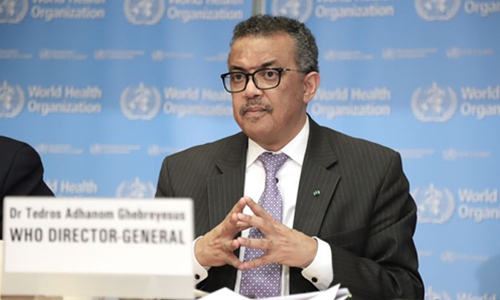US hegemony in peril amid COVID-19 pandemic
By Shen Yi Source:Global Times Published: 2020/4/11 15:48:40

WHO Director-General Tedros Adhanom Ghebreyesus speaks at a daily briefing in Geneva, Switzerland on March 9. Photo: Xinhua
The raging COVID-19 pandemic not only challenges and tests the ability of countries to contain the virus but also has far-reaching implications for the international system, which has become a catalyst in accelerating the evolution of the current international order.
On Tuesday, US President Donald Trump lashed out at the World Health Organization (WHO), accusing the world health body, which is largely funded by the US, as "China centric" and threatened to halt its funding. Echoing Trump, his right-hand man US Secretary of State Mike Pompeo said Wednesday the US administration is reevaluating WHO funding, adding "we take taxpayer money and give it to them for the benefit of America, we need to make sure it's delivering on those taxpayer dollars." Such remarks are worthy of attention as they have eroded the moral ground of the US hegemony and forced people to contemplate on how to effectively provide the world the much-needed public goods during these changing times.
In the fight against the novel coronavirus, WHO, an international intergovernmental organization within the framework of the United Nations, has played its proper role in releasing information, sharing data and material and raising cautions. To be fair, WHO has done everything in its power to address the COVID-19 pandemic challenges within its existing framework and responsibilities.
From a theoretical perspective of international relations, the US, as a hegemonic power and global leader, should assume responsibility for providing the global public goods. The worldwide spread of the novel coronavirus suggests that the problem is not about outdated global governance or a global governance surplus, but there is insufficient traction of global governance. The key reason is the US, at the center of global leadership, does not have enough capacity or willingness to provide the global public goods. The two pillars of US hegemony - military strength and financial system - can only play a very limited role in this fight against the virus. Given the US' prevailing attitude toward the WHO, it is necessary to reconsider the US and European countries' real purpose of establishing international organizations, and whether this purpose meets people's needs and the challenges that the world will face in the future.
Be it the US or Europe, both initially showed their contempt and disregard when facing the global spread of COVID-19, followed by a shortsighted approach. The US and Europe could have had enough time to react and they possess sufficient resources and technology. However, the pandemic befell because of their visible loopholes in cognition and emergency action capabilities.
From this point of view, the COVID-19 outbreak, and the statements and actions made by the US and the efforts of developed European countries to shirk responsibility reflect that they have given up the leadership roles and obligations of global governance that they once took for granted. The immediate consequence is that the moral ground - the most important asset of US hegemony - has been severely slashed.
This moral basis was established through the long-term dissemination of liberalism and neoliberalism during and after the Cold War. Its core idea is to emphasize the "morality" behind the US hegemony and the justice of the public goods that the US provides for the whole world. By providing such public goods, the US has gained leadership and influence of the international community. However, the US has not shown enough convincing leadership in the face of the COVID-19 pandemic. As a result, new leadership in global governance has begun to shift to countries with the will and ability.
For the emerging countries, represented by China, they have a clear understanding or even consensus on the direction of the new approach to global governance. In other words, governance must strive to achieve the basic vision of a community with a shared future for mankind. Only in the common interest of mankind, such as human life and health, can governance reach a higher level of international coordination and respond more effectively to the impacts, challenges, and tests of the COVID-19 pandemic.
Despite the ups and downs, the general trend of globalization is irreversible. Since the US is somehow willing to give up its constructive role in the fight against the COVID-19 pandemic, the history will inevitably move forward to completely turn the page of US hegemony.
The author is director at the Research Center for Cyberspace Governance, Fudan University. opinion@globaltimes.com.cn
Posted in: VIEWPOINT,CHINA-US